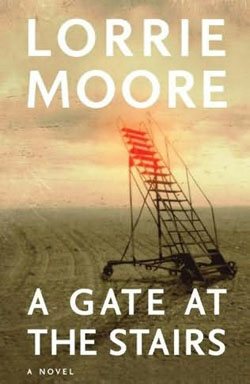A Gate at the Stairs
by Lorrie Moore
reviewed by Nicole Lamy
What a joy it is to luxuriate in Lorrie Moore’s sentences after such a long, humorless decade. It is easy to believe that it has been ten years since her vital short story collection, Birds of America, held despair, loneliness, and absurdity in a big embrace. Despite so many years without a new book, readers of Moore would undoubtedly still recognize her style if it were translated from English into Igbo and back again. Her empathic, self-effacing characters always make light of the dark: “I had donated my plasma several times for cash, but the last time I had tried the clinic had turned me away, saying my plasma was cloudy from having eaten cheese the night before. Cloudy Plasma! I would be the bass guitarist!”
In A Gate at the Stairs, Moore returns to the long form; her sixth book is a novel. The book opens in Troy, an Illinois college town of Moore’s imagination, during the winter after 9/11. Tassie Keltjin, a farm girl nauseated by milking cows, is dazzled by the rigor and frivolity of her modern liberal arts education: “Twice a week a young professor named Thad, dressed in jeans and a tie, stood before a lecture hall of stunned farm kids like me and spoke thrillingly of Henry James’s masturbation of the comma.”
When she’s not in classes with names like Soundtracks to War Movies, Wine Tasting, and Intro to Sufism, Tassie wisecracks with her erstwhile roommate, Murph, and plays an electric bass, improvising songs that are by turns nonsensical and wise. Back home in Dellacrosse Central, she avoids her childhood friends and family by hanging out in her room reading Joyce, Kant, and Homer—activities familiar to undergraduates everywhere who bide their time, waiting for their lives to begin.
When, on the eve of winter break, she finds herself cash-strapped, Tassie hunts for a job as a nanny, though not out of any particular love for children, “I liked children—I did!—or rather, I liked them OK. They were sometimes interesting. I admired their stamina and candor.” After being interviewed by a string of frazzled-looking pregnant women, Tassie meets Sarah Brink, a wry, sophisticated chef, and her cad of a husband, who are searching for a baby to adopt.
This is the richest and most satisfying section in the novel. Tassie’s involvement with Sarah offers her a real education. She gets pulled along on a series of excruciating meetings with birth mothers (who, Tassie wisely observes, could use some adoptive parents of their own) and the adoption agency representatives who exploit them. When Sarah and her husband find a baby to bring home, Tassie bonds with the lively, multiracial toddler and yet remains, as a nanny, an outsider, loving someone else’s baby and living other people’s lives.
Soon though, things go haywire for both Tassie and the novel. Tragedies mount like a pileup on the interstate: Tassie suffers first from a romance that goes personally and politically wrong and then from her underachieving brother’s fateful decision to enlist. Each strand could have been its own short story, but together they fail to connect. Readers are left with a kind of Big Issues soup: terrorism, racism, and war, plus other, more personal tragedies. None of it, though, prepares readers for the most baffling part of the book—the lurid big reveal. In a set piece that could have been ghost-written by Nancy Grace, Sarah tells Tassie a horror story from her past. She means to explain her life and yet her confession only obscures her motivations. Perhaps, by the offhand way in which Sarah tells the story, we are meant to understand the banality of evil or the idea that no person can really ever know another. But even this feels like a stretch.
All of this is disappointing because the thematic center of this book—the vagaries of caregiving and mothering—is well within Moore’s grasp. The story of Tassie’s real-world schooling during her junior year at college holds more than enough meaning to sustain an entire novel. In the end, one is left with the feeling that A Gate at the Stairs might have accomplished more if it had attempted less.
Published on March 6, 2015

